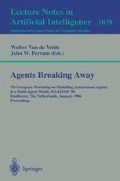Abstract
It is widely recognized that intelligent and autonomous agents operating in a distributed environment must be able to reason about their own and other agents'beliefs. Standard possible world semantics, usually used for such an endeavor, lead to formalization in which agents suffer the “logical omniscience problem” — they believe all valid formulas and all the logical consequences of their own beliefs. As far as we know, no taxonomic analysis exists which describes all the possible ways in which this phenomenon can or can not arise. The goal of this paper is to fill this gap. Our approach is based on the idea of first providing a set-theoretic specification of agents'beliefs, and then to define constructors for such sets. This allows us first to provide a set of constructors modeling ideal believers, and then to analyze how such constructors can be modified to generate real believers. The constructors defined turn out to be inference rules inside a multicontext system.
Preview
Unable to display preview. Download preview PDF.
References
J.Y. Halpern and Y. Moses. A guide to the modal logics of knowledge and belief: preliminary draft. In Proc. of the 9th International Joint Conference on Artificial Intelligence, pages 480–490, Los Angeles, CA, 1985. Morgan Kaufmann Publ. Inc.
R. Fagin and J.Y. Halpern. Belief, awareness, and limited reasoning. Artificial Intelligence, 34:39–76, 1988.
R. Fagin, J.Y. Halpern, Y. Moses, and M. Y. Vardi. Reasoning about knowledge. Stanford Bookstore, 1992.
K. Konolige. A deduction model of belief. Pitnam, London, 1986.
J. Hintikka. Knowledge and Belief. Cornell University Press, Ithaca, NY, 1962.
A. Lansky. Localized Event-Based Reasoning for Multiagent Domains. Computational Intelligence, 4:319–339, 1988.
F. Giunchiglia and L. Serafini. Multilanguage hierarchical logics (or: how we can do without modal logics). Artificial Intelligence, 65:29–70, 1994. Also IRST-Technical Report 9110-07, IRST, Trento, Italy.
F. Giunchiglia. Contextual reasoning. Epistemologia, special issue on I Linguaggi e le Macchine, XVI:345–364, 1993. Short version in Proceedings IJCAI'93 Workshop on Using Knowledge in its Context, Chambery, France, 1993, pp. 39–49. Also IRST-Technical Report 9211-20, IRST, Trento, Italy.
H. Levesque. A logic of implicit and explicit belief. In AAAI-84, pages 198–202, 1984.
F. Giunchiglia, L. Serafini, E. Giunchiglia, and M. Frixione. Non-Omniscient Belief as Context-Based Reasoning. In Proc. of the 13th International Joint Conference on Artificial Intelligence, pages 548–554, Chambery, France, 1993. Also IRST-Technical Report 9206-03, IRST, Trento, Italy.
E. Giunchiglia, F. Giunchiglia, and L. Serafini. Agents as Resasoners, Observers or Believers. In AI * IA 95, 4rd Congress of the Italian Association for Artificial Intelligence, number 992 in LNAI, pages 414–425, Firenze, October 1995. Springer Verlag.
Y. Wilks and J. Biem. Speech acts and multiple environments. In Proc. of the 6th International Joint Conference on Artificial Intelligence, 1979.
F. Giunchiglia and R.W. Weyhrauch. A multi-context monotonic axiomatization of inessential non-monotonicity. In D. Nardi and P. Maes, editors, Meta-level architectures and Reflection, pages 271–285. North Holland, 1988. Also DIST Technical Report 9105-02, DIST, University of Genova, Italy.
J. McCarthy. Notes on Formalizing Context. In Proc, of the 13th International Joint Conference on Artificial Intelligence, pages 555–560, Chambery, France, 1993.
A. Cimatti and L. Serafini. Multi-Agent Reasoning with Belief Contexts II: Elaboration Tolerance. In Proc. 1st Int. Conference on Multi-Agent Systems (ICMAS-95), pages 57–64, 1995. Also IRST-Technical Report 9412-09, IRST, Trento, Italy. To be presented at Commonsense-96, Third Symposium on Logical Formalizations of Commonsense Reasoning, Stanford University, 1996.
F. Giunchiglia. The GETFOL Manual — GETFOL version 1. Technical Report 92-0010, DIST — University of Genova, Genoa, Italy, 1992.
R.W. Weyhrauch. Prolegomena to a Theory of Mechanized Formal Reasoning. Artificial Intelligence, 13(1):133–176, 1980.
Author information
Authors and Affiliations
Consortia
Editor information
Rights and permissions
Copyright information
© 1996 Springer-Verlag Berlin Heidelberg
About this paper
Cite this paper
Giunchiglia, F., Giunchiglia, E., Mechanized Reasoning Group. (1996). Ideal and real belief about belief: Some intuitions. In: Van de Velde, W., Perram, J.W. (eds) Agents Breaking Away. MAAMAW 1996. Lecture Notes in Computer Science, vol 1038. Springer, Berlin, Heidelberg. https://doi.org/10.1007/BFb0031842
Download citation
DOI: https://doi.org/10.1007/BFb0031842
Published:
Publisher Name: Springer, Berlin, Heidelberg
Print ISBN: 978-3-540-60852-3
Online ISBN: 978-3-540-49621-2
eBook Packages: Springer Book Archive

